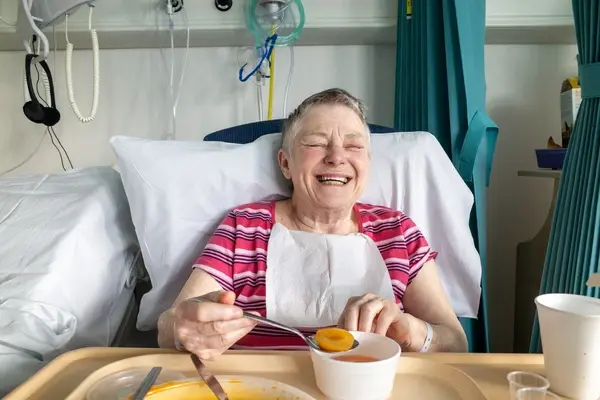Recovering from surgery can be a challenging time for many. Lots of patients find normally mundane tasks like cooking, driving, bathing, and dressing more difficult than normal. Providing the right care for a relative after surgery can have a positive impact on their recovery. This can help get them back to feeling like themselves as soon as possible.
While this can be a stressful time for you and your family, a few simple steps can help make things easier for everyone. In this article, we’ve shared some ideas for caring for a loved one after surgery. From preoperative considerations to postoperative home care, we hope you find the advice below helpful.

Before their surgery
There are a few steps you can take before your relative’s surgery. These include getting some relevant information from their medical team, and arranging the time off you’ll need to care for them.
Questions to ask before a relative has surgery
From knee replacements to cataract surgery, each procedure is different and has its own issues and limitations. Understanding exactly what your relative will be going through, and the expectations around limitations afterwards can help you properly prepare. Some useful questions to ask the medical team are:
- what are the potential risks and complications from the surgery?
- what limitations will they have after surgery?
- what is the expected recovery time?
- are there any special instructions for pre or post-operative care?
Taking time off to look after a relative following surgery
You may need to take time off while helping with your relative’s post-operative care. This will give you the necessary time to focus on their care while reducing additional sources of stress for you.
Communicating with your employer about the length and nature of the time off you’ll need can help in making proper arrangements. It may be that the amount of time you’ll need to commit to post-operative care will decrease, allowing you to go back to work on a part-time basis. This is where communicating with the medical team about what to expect is important.
You may also be interesting in…
- What to do when an elderly parent refuses medical treatment
- A guide to self-pay and health insurance for elderly patients
- Preparing for when an elderly parent has surgery – a guide
Tips for looking after a relative following surgery
The days after surgery can be stressful for everyone involved, but being patient and prepared can help speed up the recovery process and improve the wellbeing of both you and your family member.
Post-operative care at the hospital
During the initial recovery period at the hospital, try to be involved in discussions with the medical team. This will help you understand the post-surgery care plan. Depending on the type of surgery, this may include:
- pain medication and management
- wound care
- mobility exercises.
This is the best time to ask any questions you might have following the surgery, and ensure you have any equipment you might need for care at home.
After surgery care at home
Once your relative can return home, the responsibility of care shifts. Create a safe space where they feel comfortable for their recovery. You’ll need to consider factors like accessibility, hygiene, and the need for any medical equipment. If they require regular medication, you may need to help them collect it, and make sure they’re taking the right dose at the right time.
The first few days can be stressful for everyone involved, but they are also when your relative needs you most. It’s important to be patient and prepared. Major surgery, such as hip replacement surgery, can greatly reduce a patient’s mobility. Striking the right balance between support and independence is important, and will change as they recover. As their recovery progresses, encourage them to do more on their own and help them reclaim their sense of independence.
While at home, stay vigilant for any signs of post-surgery complications. These can range from sleep problems to serious issues like infections. Talking to the medical team beforehand about what to look out for can help you identify and quickly respond to any issues.
After surgery home care costs – what’s involved?
Understanding the financial costs of post-surgery care is essential. Discuss potential costs with the healthcare provider and explore options such as health insurance coverage for elderly parents, government assistance programs, or community resources. These can all help to ease the financial burden.
Surgery recovery guides
Our recovery guides for specific treatments might be useful when looking after your relative after their operation:
- Knee replacement recovery guide
- Hip replacement recovery guide
- Hernia surgery recovery guide
- Cataract surgery recovery guide
- Carpal tunnel surgery recovery guide
Caring for your relative after surgery – FAQs
Still have concerns about your family members’ post-surgery care? We’ve answered some of the most common questions below.
Offering emotional support can be one of the most important things you do, and will help speed up their recovery from surgery. Beyond that, assist them with daily activities they may struggle with, and help them complete any rehabilitation exercises.
Respite care provides temporary relief for primary caregivers by having someone else provide care for a period of time. It allows you to take a break from caring for your relative and look after your own physical and mental wellbeing. Local councils and carers’ centres can provide information on local funding and support.
Post-surgery can be a stressful time for people as they struggle with pain, tiredness, and frustration. They may experience changes in mood, discomfort, and potential setbacks in their recovery process. Be patient and adaptable to provide them with the care they need.
Having someone present for the first 24 hours after surgical procedures is crucial. During this time, it’s important to monitor the patient’s condition, manage pain, and respond to any immediate needs or emergencies.
If no family support after surgery is available, home care options are available. This means a carer will come to assist you with tasks such as meal preparation, transportation, medication, and physiotherapy.
Talk to us today to find out more about how you and your relative can best prepare for any upcoming surgery.





